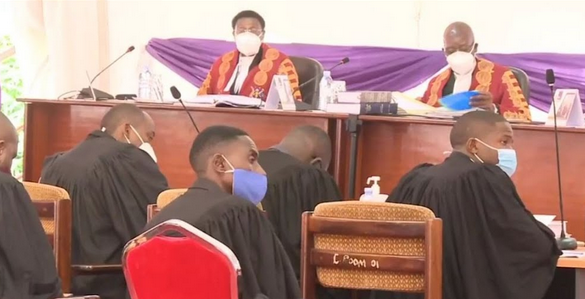Photo: YouTube
The Constitutional Court in Kampala has ruled that Section 25 of the Computer Misuse Act, 2011 highlighting offensive communication contravenes the constitution. This means that this offensive section of the law is illegal.
In 2016, Counsel Andrew Karamagi and activist Robert Shaka (the latter accused of being the shadowy anti-government micro-blogger Tom Voltaire Okwalinga) went to court to challenge this law as an impingement on due process.
Section 25 of the Computer Misuse Act 2001 states: “willful and repeated use of electronic communication to disturb or attempt to disturb the peace, quiet or right of privacy of any person with no purpose of legitimate communication whether or not a conversation ensues” and is punishable by “a fine not exceeding twenty four currency points or imprisonment not exceeding one year or both.”
However, today, a panel of five justices of the Constitutional Court comprising the deputy Chief Justice Richard Buteera, Kenneth Kakuru, Geoffrey Kiryabwire, Elizabeth Musoke and Monica Mugenyi ruled that the law is unconstitutional.
“I find that the impugned Section is unjustifiable as it curtails the freedom of speech in a free and democratic society. Secondly, Section 25 of the Computer Misuse Act does not specify what conduct constitutes offensive communication. To that extent it does not afford sufficient guidance for legal debate. Thirdly it is vague, overly broad and ambiguous. Therefore, I find that the impugned section is inconsistent with and/or in contravention of Article 29 of the Constitution,” Justice Kakuru said in the lead judgment.
He added, “Section 25 of the Computer Misuse Act 2011 is null and void as it is inconsistent and/or in contravention with Article 29 (l) of the Constitution. Therefore, the enforcement of Section 25 of the Computer Misuse Act No. 2 of 2011 is hereby stayed.”
We appreciate this victory but it is pyrrhic if it does not include the accompanying judgment of the Museveni junta paying costs and damages to all those who were accused of this law, namely Kakwenza Rukirabashaija and Stella Nyanzi, to name but two of its victims.
Kakwenza and Nyanzi were hounded out of the country after being jailed, tortured and having their rights abridged to near-nothing.
Justice Kakuru must accept that the two and others who were and are innocent, hence must be awarded costs in court.
Then, if they so wish, he must hear their cases which amount to a vote of no confidence in a Museveni junta long past its use-by date.
However, that is not all.
This ruling should result in more judicial protection for other shock jock literati, thereby allowing them to call things as they see them.
Again, it must remind the puerile NRM junta that sticks and stones may break our bones but names will never hurt us.
Thus Nyanzi and Kakwenza are less of a threat to our society than the wielders of sticks and stones (military arsenal) as Museveni and his cabal clearly are.
Their violence and threats of violence do violence to the very notion of freedom and so they must be brought to trial for being offensive to democracy and decency.
For they have broken every law on the statute books by robbing the country white and then punishing those who call them out for doing so.
They must pay and must pay dearly for the scars they not only inflicted upon Kakwenza’s person but also meted out to a society reeling from its NRM-inflicted wounds.
The time is now.
The flipside of this ruling implies the guilt of those who perpetrated this law.
We understand that such a legal course of action will be fraught with danger, but there is more danger in allowing Museveni’s junta get away with the crimes against humanity that it commits routinely.





